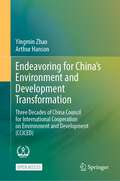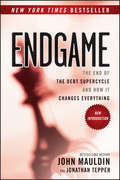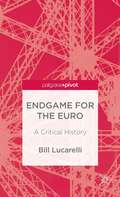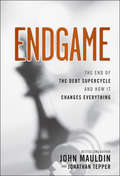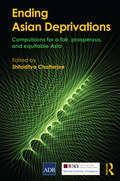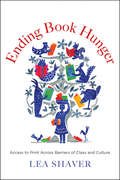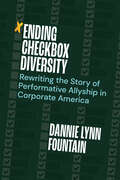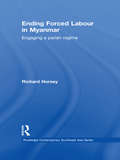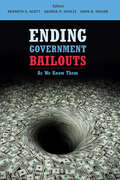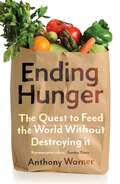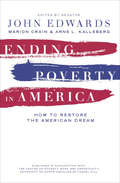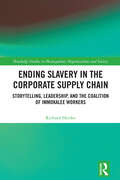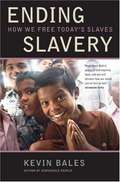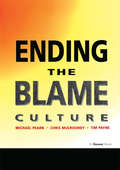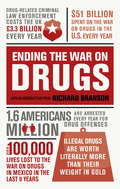- Table View
- List View
Endeavor--Determining a Growth Strategy
by William A. Sahlman Michael J. RobertsDescribes the progress of a nonprofit organization, Endeavor, focused on nurturing entrepreneurship in emerging markets. At the time of the case, it has successfully expanded to five Latin American countries and is contemplating the next phase in its growth. Specifically, it must decide how quickly and to which countries/regions to expand. In addition, the organization has been successful in raising money at the local level to support its country affiliates, but has had more issues related to raising the funding for its operations in New York. Thus, a key question is which funding model to use to support these headquarters operations. Includes a good deal of information regarding the prevalence of entrepreneurship in various countries, as well as economic data on a great variety of countries. A rewritten version of an earlier case.
Endeavor: Creating a Global Movement for High-Impact Entrepreneurship
by William A. SahlmanThis case describes a critical inflection point in the growth of an international development "mentor capitalist" nonprofit, Endeavor. As Endeavor aims to scale its high-impact entrepreneurship model globally, founder Linda Rottenberg must determine what success looks like for the organization and which growth option will most effectively take Endeavor in that direction. The case begins with a panel of business leaders selecting a new class of Jordanian entrepreneurs to join the ranks of Endeavor's prestigious portfolio. Their decision forces them to wrestle with the questions: "What is high impact entrepreneurship, and how will it contribute to the economic development of a country like Jordan?"
Endeavoring for China’s Environment and Development Transformation: Three Decades of China Council for International Cooperation on Environment and Development (CCICED)
by Yingmin Zhao Arthur HansonThis is an open access book. CCICED has been woven into the fabric of China’s environmental development for the past 30 years—the length of an entire generation. It is also consistent with the most rapid modernization shift of the nation’s economy–environment relationship. This report provides insights into how CCICED operates and its success stories. It also presents a general picture of how changes of China in environmental development have taken place. CCICED at 30 is therefore a helpful account for future directions of sustainable environment.
Endeca Technologies (A)
by Josh Lerner G. Felda Hardymon Ann LeamonSteve Papa, CEO of Endeca Technologies, must decide among two term sheets raising the same amount of badly needed money for his young software company. One deal is led by insiders and, is offered at a lower price. It continues a board that has worked very well and shares a common vision. It also is likely to involve a very important potential customer. The second offer comes from a group with which Papa does not have history. Although it carries a higher price, it will change the board structure and also requires that the closing be delayed a week, from September 7, 2001, to September 14. The company has cash only into October so, if anything goes wrong, Papa is unlikely to be able to arrange alternate financing. Discusses which option he should accept.
Endeca Technologies: New Growth Opportunities
by Paul A. Gompers Kristin A. PerrySteve Papa, CEO of Endeca Technologies, must decide whether to expand into a new market with a new application of his company's technology. Endeca has experienced significant success with its information access software in the online retail industry, and in September 2004 is poised to enter similar industries with similar products. However, it also faces an opportunity to create a unique solution for the manufacturing industry, a market the company knows little about and that has proven difficult to enter in the past. Which expansion strategy should Papa choose? Although the manufacturing market would yield a much higher average deal size, significant uncertainty surrounded a move away from Endeca's core business. It would impact the company's sales practices, organizational structure, product requirements, and decisions about whether to partner with other companies in the field. Taylor Hunte Industries, a Fortune 500 giant in the manufacturing industry, has just invited Endeca to submit a request for proposal--due in just 10 days.
Endesa Chile: Raising the Ralco Dam (A)
by Kathleen L. Mcginn Paula J. Lashober Dina PradelEndesa Chile, the largest electricity generation company in Chile, is building a major power plant on the Biobio River in Southern Chile. A historic conflict involving the indigenous people of the Biobio River, the Chilean government, and international conservation groups results. The conflict threatens the completion of the project and the longstanding culture and community of the Penhuenche, the indigenous people of the Upper Biobio.
Endesa Chile: Raising the Ralco Dam (A)
by Paula J. Lashober Dina Pradel Kathleen L. McGinnEndesa Chile, the largest electricity generation company in Chile, is building a major power plant on the Biobio River in Southern Chile. A historic conflict involving the indigenous people of the Biobio River, the Chilean government, and international conservation groups results. The conflict threatens the completion of the project and the longstanding culture and community of the Penhuenche, the indigenous people of the Upper Biobio.
Endesa Chile: Raising the Ralco Dam (B)
by Kathleen L. Mcginn Paula J. Lashober Dina PradelAn abstract is not available for this product.
Endesa Chile: Raising the Ralco Dam (Synopsis)
by Kathleen L. McGinnThis is a short synopsis of both the A & B cases (906014 and 906015).
Endgame
by John Mauldin Jonathan TepperGreece isn't the only country drowning in debt. The Debt Supercycle--when the easily managed, decades-long growth of debt results in a massive sovereign debt and credit crisis--is affecting developed countries around the world, including the United States. For these countries, there are only two options, and neither is good--restructure the debt or reduce it through austerity measures. Endgame details the Debt Supercycle and the sovereign debt crisis, and shows that, while there are no good choices, the worst choice would be to ignore the deleveraging resulting from the credit crisis. The book:Reveals why the world economy is in for an extended period of sluggish growth, high unemployment, and volatile markets punctuated by persistent recessionsReviews global markets, trends in population, government policies, and currenciesAround the world, countries are faced with difficult choices. Endgame provides a framework for making those choices.
Endgame for the Euro: A Critical History
by Bill LucarelliThis short volume provides an incisive critical history of the evolution of the euro and a devastating critique of the economic doctrines that have informed its institutional design.
Endgame: The End of the Debt SuperCycle and How It Changes Everything
by John Mauldin Jonathan TepperGreece isn't the only country drowning in debt. The Debt Supercycle—when the easily managed, decades-long growth of debt results in a massive sovereign debt and credit crisis—is affecting developed countries around the world, including the United States. For these countries, there are only two options, and neither is good—restructure the debt or reduce it through austerity measures. Endgame details the Debt Supercycle and the sovereign debt crisis, and shows that, while there are no good choices, the worst choice would be to ignore the deleveraging resulting from the credit crisis. The book: Reveals why the world economy is in for an extended period of sluggish growth, high unemployment, and volatile markets punctuated by persistent recessions Reviews global markets, trends in population, government policies, and currencies Around the world, countries are faced with difficult choices. Endgame provides a framework for making those choices.
Ending Asian Deprivations: Compulsions for a Fair, Prosperous and Equitable Asia
by Shiladitya ChatterjeeDespite Asia’s rapid growth, vast sections of its population still live in poverty and suffer hunger and other forms of deprivation. Merely relying on Asia’s growth will not help the deprived see a better future in their lifetimes. Ways must be found to make growth more inclusive combined with proactive public action to bring substantial improvements in the lives of Asia’s deprived people. This book is written by a set of experts who have been working long on reducing various aspects of human deprivations in Asia. It begins with a discussion of the massive dimensions of deprivations that continue to exist in Asia. Although many countries have adopted inclusive growth strategies to enable the benefits of growth to reach the poor, much more needs to be done to make growth processes more broad based and beneficial to all. The book points to essential action needed to bring this about. The book also emphasizes the crucial role of determined, target driven public action if Asia’s deprived populations are to see substantial improvement in their lives. Practical measures to tackle problems of hunger, unemployment, gender discrimination, ill health, lack of quality basic education, inadequate access to clean water and basic sanitation are each discussed. The problems of the urban poor and migrants who continue to flock to Asia’s cities are also highlighted. The book also emphasizes the need for an appropriate environment for public action to succeed including strong participatory institutions, effective governance, social protection and regional cooperation.
Ending Book Hunger: Access to Print Across Barriers of Class and Culture
by Lea ShaverAn eye-opening exploration of “book hunger”—the unmet need for books in underserved communities—and efforts to universalize access to print Worldwide, billions of people suffer from book hunger. For them, books are too few, too expensive, or do not even exist in their languages. Lea Shaver argues that this is an educational crisis: the most reliable predictor of children’s achievement is the size of their families’ book collections. <P><P>This book highlights innovative nonprofit solutions to expand access to print. First Book, for example, offers diverse books to teachers at bargain prices. Imagination Library mails picture books to support early literacy in book deserts. Worldreader promotes mobile reading in developing countries by turning phones into digital libraries. Pratham Books creates open access stories that anyone may freely copy, adapt, and translate. <P><P>Can such efforts expand to bring books to the next billion would-be readers? Shaver reveals the powerful roles of copyright law and licensing, and sounds the clarion call for readers to contribute their own talents to the fight against book hunger.
Ending Checkbox Diversity: Rewriting the Story of Performative Allyship in Corporate America
by Dannie Lynn FountainA Google strategist shows how companies can move beyond performative allyship into the authentic enactment of diversity, equity, and inclusion.After being in corporate America for nearly a decade as a triple minority who passes for a straight white woman, Dannie Lynn Fountain knows that corporations' modern plague is the story of its DEI duality. Time and time again, she has witnessed companies pretend to care about DEI for public relations fodder and then discriminate against employees or ignore their identities. Dannie's solution to this problem? Rage against the system by refusing to accept mediocre-at-best action. This story isn't just about how messed up corporate DEI currently is; it also takes a hard look at what is necessary to get diversity right in three parts: ● The context of corporate DEI● Why the change in perspective● What's not working and how to change Ending Checkbox Diversity gives readers an understanding of exactly how corporate America is failing underrepresented identities and offers a plan for what to do next, with clear examples and metrics for evaluating DEI in their own careers and aligning themselves with companies that are actually doing the work.
Ending Forced Labour in Myanmar: Engaging a Pariah Regime (Routledge Contemporary Southeast Asia Series)
by Richard HorseyThe International Labour Organization’s (ILO) efforts since the early 1990s to address the forced labour situation in Myanmar represent a rare example of success in influencing the behaviour of that regime, and this book gives a first-hand account of these efforts. As the ILO’s representative in the country, the author was able to operate a complaint system for victims of forced labour, resulting in prosecutions of government officials and an end to many abuses. In addition to giving a fascinating insider’s account of how this was achieved, and the many challenges encountered, the book examines in detail why one of the most repressive military regimes allowed the ILO to operate a complaints mechanism in the first place, and why it felt the need to take action in response to some of those complaints. This book will make a significant contribution to thinking on how to influence authoritarian regimes, as well as understanding the dynamic of relations with Myanmar. As such it is an essential read for scholars of international relations and global governance, human rights, international law and Southeast Asian studies.
Ending Government Bailouts as We Know Them
by George P. Shultz Kenneth E. ScottThis book examines the dangers of continuing government bailouts and offers alternative strategies designed to produce growth based on the vigor of the private sector with inflation under control. The expert authors show that it is indeed possible to explain the causes of the crisis in understandable terms and clarify why resolving the bailout problem is essential to preventing future crises.
Ending Hunger: The quest to feed the world without destroying it
by Anthony WarnerNutritionists tell you to eat more fish. Environmentalists tell you to eat less fish. Apparently they are both right. It's the same thing with almonds, or quinoa, or a hundred other foods. But is it really incumbent on us as individuals to resolve this looming global catastrophe? From plastic packaging to soil depletion to flatulent cows, we are bombarded with information about the perils of our food system. Drawing on years of experience within the food industry, Anthony Warner invites us to reconsider what we think we know. In Ending Hunger, he uncovers the parallels between eating locally and 1930s fascism, promotes the potential for good in genetic modification and dispels the assumption that population growth is at the heart of our planetary woes.
Ending Poverty in America: How to Restore the American Dream
by David K. Shipler Thomas M. Shapiro Jared Bernstein Katherine S. Newman Elizabeth Warren Richard B. Freeman Jacob S. Hacker William Julius Wilson Michael Ferber Michael S. Barr John Karl Scholz Hugh B. Price Beth Shulman Harry J. Holzer Michael Sherraden Ronald B. Mincy Anita Brown-Graham Carol Mendez Cassell Martin Eakes Jack F. Kemp Sara McLanahan Melvin L. Oliver Peter Orszag Dennis K. Orthner Hillard Pouncy Ruston Seaman David Spickard Michael A. StegmanAn &“engrossing collection of rigorously researched articles&” from Elizabeth Warren, Jared Bernstein, William Julius Wilson, and more (Publishers Weekly). Can the wealthiest nation in the world do anything to combat the steadily rising numbers of Americans living in poverty—or the tens of millions of Americans living in &“near poverty&”? In this book, some of the country&’s most prominent scholars, businesspeople, and community activists answer with a resounding yes. Published in conjunction with one of the country&’s leading anti-poverty centers, Ending Poverty in America brings together respected social scientists, journalists, neighborhood organizers, and business leaders—both liberal and conservative—to tackle hot-button issues such as job creation, schools, housing, and family-friendly social policy, offering a template for a renewed public debate and a genuine effort to confront this urgent issue that undermines the long-term security of our nation. Contributors include: Jared Bernstein, Anita Brown-Graham, Carol Mendez Cassell, Richard Freeman, Angela Glover-Blackwell, Jacob Hacker, Harry Holzer, Jack F. Kemp, Ronald Mincy, Katherine S. Newman, Melvin L. Oliver, Dennis Orthner, David K. Shipler, Beth Shulman, Michael A. Stegman, Elizabeth Warren, William Julius Wilson.
Ending Slavery in the Corporate Supply Chain: Storytelling, Leadership, and the Coalition of Immokalee Workers (Routledge Studies in Management, Organizations and Society)
by Richard HerderThe Coalition of Immokalee Workers (CIW) is a Florida-based farmworkers’ cooperative that has received international acclaim for sponsoring anti-slavery investigations. In 2011, they worked with commercial tomato growers to found the Fair Food Program, a private sector agreement that operates according to the principles of worker-driven social responsibility (WSR). Researchers have lauded WSR as an alternative to traditional corporate social responsibility (CSR) programs, which have failed to curb human exploitation in global markets. The Fair Food Program has been credited with ending slavery and other human rights abuses in Florida’s tomato industry and is now expanding to other sectors of the food economy in the United States and several other nations. Researchers have called for WSR programs to be included in a “smart mix” of public and private initiatives aimed at abolishing slavery and other types of exploitation in global supply chains. The book introduces a theory of ensemble storytelling to explain how the CIW has been able to animate workers, fight slavery, influence multinational corporations, and expand the Fair Food Program. The phrase ensemble storytelling refers to a set of collective, dynamic storytelling practices. They are described as foundational to the operation of any WSR program.
Ending the Blame Culture
by Michael Pearn Chris MulrooneyThis book is about mistakes and what we can learn from them. It faces up to, and explains how organizations can escape from ’blame cultures’, where fearful conformance and risk avoidance lead to stagnation, to ’gain cultures’ which tolerate and even encourage mistakes in the pursuit of innovation, change and improvement. Ending the Blame Culture was written as a result of systematic analysis of the content of over 200 accounts of real mistakes within businesses and organizations. This analysis provides both insight and understanding into the type of mistakes made, the context they were made in and how they helped learning and development. As a result the authors are able to distinguish between intelligent and undesirable mistakes: those which should be tolerated and those which must be avoided. The result is a book which gives sound advice on how individuals learn, practical measures that organizations can adopt to enhance learning through better management of mistakes, and the promotion of a culture which supports and fosters experimentation and risk taking.

